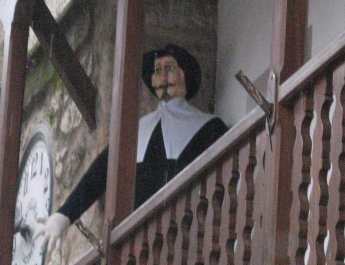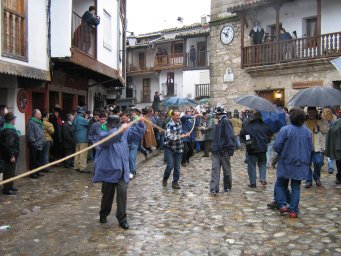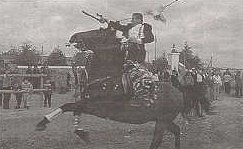Pero Palo 2010 ... in Record Time
 Also this year we have organized a strong
international protest accompanied by a petition
(currently there are 7634 signatures), promoted by
the Spanish friends of El Refugio del Burrito and
with our collaboration, which asks to new
President of Extremadura, to enact a law to prohibit
the use of the donkey.
Also this year we have organized a strong
international protest accompanied by a petition
(currently there are 7634 signatures), promoted by
the Spanish friends of El Refugio del Burrito and
with our collaboration, which asks to new
President of Extremadura, to enact a law to prohibit
the use of the donkey.
Special thanks to our Mauro Bertini, who probed the net to find dozens of email addresses of animal welfare groups across all Europe.
 The
hopes for success were based on the fact that the
new government had shown significant sensibility for
animal welfare issues, especially regarding to the
welfare of donkeys, in fact, until the very day
before the fiesta, no one knew whether or not the
region would authorize the use of "burrito".
(donkey)
The
hopes for success were based on the fact that the
new government had shown significant sensibility for
animal welfare issues, especially regarding to the
welfare of donkeys, in fact, until the very day
before the fiesta, no one knew whether or not the
region would authorize the use of "burrito".
(donkey)
The climate was very hot since the City Council of Villanueva de la Vera, had shown a clear willingness to disobey (especially having the comfort of almost all of the local citizens) in the event that the capital (Caceres), was about to ban.
 But
what were the consequences of disobedience?
Definitely a huge difficulty in managing this issue
and therefore, perhaps even to create some suspense,
the fiesta of Pero Palo could suffer the cutting of
the “Corrida de Elecciones”, which for the
inhabitants is probably also a reason for struggle
and conflict with the Regional Council.
But
what were the consequences of disobedience?
Definitely a huge difficulty in managing this issue
and therefore, perhaps even to create some suspense,
the fiesta of Pero Palo could suffer the cutting of
the “Corrida de Elecciones”, which for the
inhabitants is probably also a reason for struggle
and conflict with the Regional Council.
Not by chance, when this "corrida" had been over, many people around the donkey were screaming "Villanueva Villanueva Villanueva" it seemed as if they wanted to send a clear message: "The donkey, or rather the burrito, is not to be touched". But meanwhile the pressure on the organizers became stronger. (read the report 2010)
16 February 2010 - for the donkey still terror
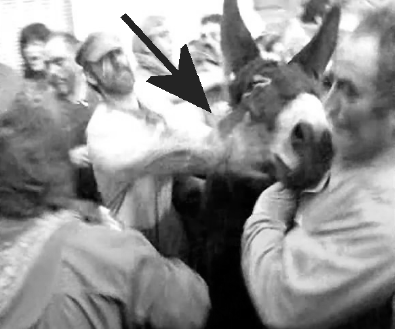 "The
party will be finished when the donkey will be finished"...
"The
party will be finished when the donkey will be finished"...
for many years this slogan, that represented very well what happened at Villanueva, is not true anymore, thanks to the protests and the international presence of the animalists.
The Spanish animalists have gotten a law in 2002 that, at least in theory, avoid the torment of the donkey. But an international mobilization is always necessary, because the local authorities, as we have ascertained, are not worried about to enforce it, to use an euphemism.
In 2009, thanks of your great contribution by sending the letter of protest and the signature of the petition, noise has been big.
We have denounced to the Guardia Civil (Police), the dependent (Jacinto) of the Commune of Villanueva de la Vera for the transport of the donkey on a vehicle not conform to the European normative and to the Spanish law. You can read the detailed report and view the video where the opinion of the local press is proved to be wrong.
Also in 2010 we will be present at Villanueva de la Vera to check what happens and to sustain the Spanish association.
But also this year we need your help. It is very important that you sign the new petition, promoted by the colleagues of the Spanish association "El Refugio del Burrito", that for years together with us, follows the local Fiesta, and that you send the letter that you will find on the right of this page ("Helped us to help the little donkey" and "Petition on line").
Thanks a lot.
Elvino Gasparotti
CEDA onlus - Comitato Europeo Difesa Animali - European Committee Defence Animals
Pero Palo - Symbol of the maltreatments
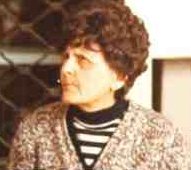 Villanueva de la Vera is a small village of not much
more than 2000 inhabitants in Extremadura; it is
theatre every year of the fiesta of the so-called "Pero Palo".
Villanueva de la Vera is a small village of not much
more than 2000 inhabitants in Extremadura; it is
theatre every year of the fiesta of the so-called "Pero Palo".
The presence of the Italian animalists has been possible thanks to the obstinacy and the determination of Clara Genero, foundress of the Lida Committee against the Corrida.
In the year of her disappearance, 2000, those who knew the spirit of sacrifice (she renounced the medicines just to finance these initiatives, with notable damage for her health) wanted to continue this her initiative, which was very important for her. In fact, this feast was a symbol of the ferocious maltreatments against animals: practically, the feast finished when the donkey finished.
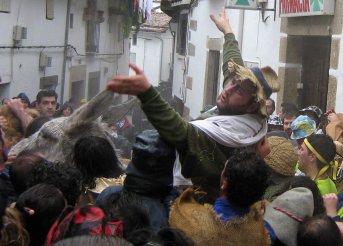 After
the year 2003, together with the section LAV and
LIVDA of Bassano del Grappa, has been organized the
presence of two Italian observatories, Gabriella
Scaperrotta and Michele Mastini, who - in comparison
to the years before - had registered an
"improvement," for the coming into force of the law
on the maltreatments of animals (read the REPORT
2003) in the year 2004, 2005 and 2006 Italian
animalists have not been present; we have returned
to Villanueva with Elvino Gasparotti e Irmgard Haub
of the delegation Tuscany of "European Committee
Defence Animals NPO", that will be witness in the next
edition (2009) as well. Unfortunately, in consequence to
the dismissal of exposé presented by animalists, we
record an shameful return to the past.
After
the year 2003, together with the section LAV and
LIVDA of Bassano del Grappa, has been organized the
presence of two Italian observatories, Gabriella
Scaperrotta and Michele Mastini, who - in comparison
to the years before - had registered an
"improvement," for the coming into force of the law
on the maltreatments of animals (read the REPORT
2003) in the year 2004, 2005 and 2006 Italian
animalists have not been present; we have returned
to Villanueva with Elvino Gasparotti e Irmgard Haub
of the delegation Tuscany of "European Committee
Defence Animals NPO", that will be witness in the next
edition (2009) as well. Unfortunately, in consequence to
the dismissal of exposé presented by animalists, we
record an shameful return to the past.
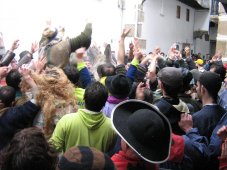 A fat man, after an abundant
meal mounts on the donkey and rides around the
village. He has to represent the „town crier” who
announced the execution, that everybody could be
present. As the years went by the donkey became the
symbol of the convict; an that's why it becomes
struck to death, especially by drunk people.
A fat man, after an abundant
meal mounts on the donkey and rides around the
village. He has to represent the „town crier” who
announced the execution, that everybody could be
present. As the years went by the donkey became the
symbol of the convict; an that's why it becomes
struck to death, especially by drunk people.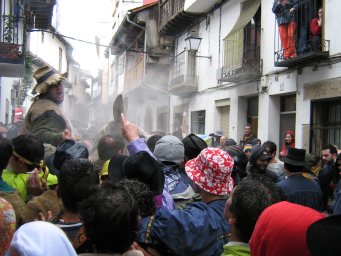 I witness, that the
photo that I
had lent to your friend to be sent to the British
press as a prove of this crime, I had shot myself in
1986. I had been pushed away (together with some
friends that had invited me to assist at this kind
of so-called parties of carnival) right because I
tried to take a near photo of the animal, though
nauseated of this exhibition of cruelty and the
inhabitants of the village had understood that I was
a curious an hostile visitor. I had been terribly
shaken by the scene: this had been noted and just
for this reason the poor animal had been beaten to
death even more pitiless. In this photo, you can see
well, on the ground, one of the limbs of the animal
sticks out of the spaces between the human legs. In
fact the animal had already fallen down and had been
covered by the people who squeezed it . Two minutes
before I had been pushed away I saw blood well in out
of the anterior legs which had been just been broken
at this moment. A photo of this lynching appeares in
the magazine „Lookout” in the number of January,
which is published at the Costa del Sol, as a partial
but exact demonstration of the monstrous cruelty of
the so-called popular Spanish Fiestas. In this
particular document you see the head taught back
brutally by some hooligans while others strike him
with sticks. I'm sure, that also you have the letter
which the mayor of the village had sent as answer at
the president of one of the Spanish associations of
protection of animals who, in these days, had
published a protest against
I witness, that the
photo that I
had lent to your friend to be sent to the British
press as a prove of this crime, I had shot myself in
1986. I had been pushed away (together with some
friends that had invited me to assist at this kind
of so-called parties of carnival) right because I
tried to take a near photo of the animal, though
nauseated of this exhibition of cruelty and the
inhabitants of the village had understood that I was
a curious an hostile visitor. I had been terribly
shaken by the scene: this had been noted and just
for this reason the poor animal had been beaten to
death even more pitiless. In this photo, you can see
well, on the ground, one of the limbs of the animal
sticks out of the spaces between the human legs. In
fact the animal had already fallen down and had been
covered by the people who squeezed it . Two minutes
before I had been pushed away I saw blood well in out
of the anterior legs which had been just been broken
at this moment. A photo of this lynching appeares in
the magazine „Lookout” in the number of January,
which is published at the Costa del Sol, as a partial
but exact demonstration of the monstrous cruelty of
the so-called popular Spanish Fiestas. In this
particular document you see the head taught back
brutally by some hooligans while others strike him
with sticks. I'm sure, that also you have the letter
which the mayor of the village had sent as answer at
the president of one of the Spanish associations of
protection of animals who, in these days, had
published a protest against
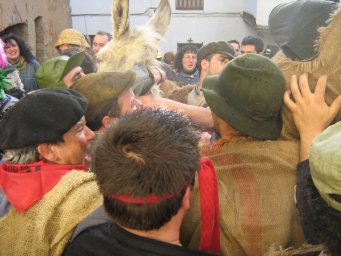 these facts. This mayor
had affirmed to have ordered at the population to
behave in a civilized mode. He regrets those events
which represent the degeneration of this kind of feasts and he complains the absence of repressive
forces in the small town-areas. Regarding this I
want to note, that Madrid is not to considerate a
small community of Spain and, nevertheless, nearby –
precisely at Fuenlabrada – in the streets happened
the public lynching of bulls, in presence of the
town guards which helped to lift (and depose) the
bloody massacred bodies on a van. This had been considered to be a scandal, even to the Spanish ”meter”,
so , for the very first time, the press of Madrid
denounced the facts instead of just giving a report,
and the mayor of Fuenlabrada and the „Governador
civil” of Madrid accused themselves reciprocally to
be responsible of what has turned to be a real orgy.
these facts. This mayor
had affirmed to have ordered at the population to
behave in a civilized mode. He regrets those events
which represent the degeneration of this kind of feasts and he complains the absence of repressive
forces in the small town-areas. Regarding this I
want to note, that Madrid is not to considerate a
small community of Spain and, nevertheless, nearby –
precisely at Fuenlabrada – in the streets happened
the public lynching of bulls, in presence of the
town guards which helped to lift (and depose) the
bloody massacred bodies on a van. This had been considered to be a scandal, even to the Spanish ”meter”,
so , for the very first time, the press of Madrid
denounced the facts instead of just giving a report,
and the mayor of Fuenlabrada and the „Governador
civil” of Madrid accused themselves reciprocally to
be responsible of what has turned to be a real orgy.